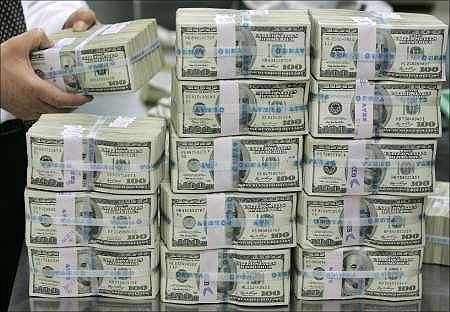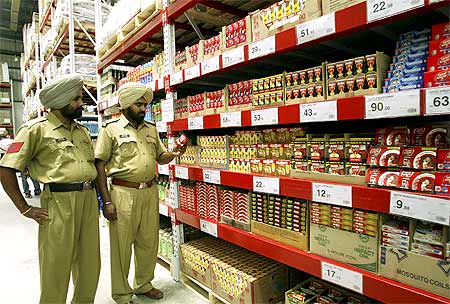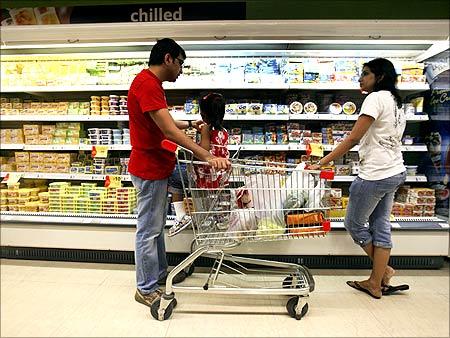 | « Back to article | Print this article |
Will India skip the hypermart stage?
Every few months, the issue of allowing foreign investment in retail erupts into a hot debate.
The need to modernise supply chains is pitted against visions of how big retail would devastate small shops.
However, even as the debate rages, there are signs that the age of global hypermarket dominance may be over.
As demonstrated by the sudden disappearance of bookshops around the world, technology is radically altering the production and distribution landscape.
Economic history can be seen as a race between transportation and communication. Innovations in transportation allow supply chains to carry ever greater quantities and thereby encourage standardisation.
Click NEXT to read further. . .
Will India skip the hypermart stage?
In contrast, innovations in communication allow better specification of design, quality, quantity and time of delivery.
This tends to encourage customisation.
Thus, the dominant economic model of any era is the result of the relative evolution of these two technologies.
In ancient times, transportation technology was poor, and most goods were produced locally.
Since consumers and producers could directly talk to each other, artisan manufacturing was mostly customised.
This was the age of the village blacksmith, weaver, potter and cobbler.
Click NEXT to read further. . .
Will India skip the hypermart stage?
In the 18th century, shipping technology improved enough to allow the creation of global supply chains.
Cotton was one of the first industries to witness this shift. Slaves from Africa were used to grow cotton in southern United States.
The cotton, in turn, was shipped to the mills of England.
The finished cloth was shipped to the rest of the world.
The biggest losers from this change were the artisan weavers and spinners of India.
It is no coincidence that Mahatma Gandhi would use the hand-turned spinning wheel as his symbol of protest against colonial rule.
By the early 20th century, transportation technology witnessed major breakthroughs that included the railways, the Suez Canal and automobiles.
Click NEXT to read further. . .
Will India skip the hypermart stage?
Ocean freight rates, for instance, fell 70 per cent between 1840 and 1910.
There were few independent improvements in communications (except the telegraph). In other words, communication was the poor cousin of transportation.
A world with good transportation but relatively underdeveloped communications meant that production was centralised at major transportation hubs, and Fordist production lines were used to mass-manufacture goods.
Vertically integrated industrial systems were needed to minimise communication gaps between various stages of production.
As mass manufacturing was ramped up, it was no longer possible for individual customers to specify requirements.
Click NEXT to read further. . .
Will India skip the hypermart stage?
This shift is best summarised by Henry Ford's famous comment: that customers 'can have a car painted in any colour, so long as it's black'.
The 1950s saw the impact of two further innovations -- telephones and containerisation.
After World War II, the price of an international call fell to a level cheap enough for common business use.
Meanwhile, containerisation dramatically improved the speed, reliability and cost of transporting goods.
By the 1970s, the Japanese had combined the two technologies to modularise production and create 'just-in-time' supply chains.
By the early 1990s, the world production system was based on a hierarchy of suppliers that ultimately fed into the final product.
Click NEXT to read further. . .
Will India skip the hypermart stage?
One of the outcomes of these supply-chain efficiency gains was that hypermarkets could leverage scale, logistics and lean inventories to squeeze prices as well as provide customers with an unprecedented array of standardised products.
Thus, we entered the age of Walmart, Tesco and Carrefour. But is this paradigm about to change?
It is now possible for the end-customer to clearly specify his/her requirements rather than hope that some standardised product will do the job.
As the bookstore industry discovered, Amazon changed the game completely by offering almost infinite choice combined with large discounts.
Yet, first-generation e-commerce still felt like a large hypermarket located on the Net.
Now near-customisation is rapidly becoming the norm.
Click NEXT to read further. . .
Will India skip the hypermart stage?
Tablets and mobile devices, for instance, allow us to access applications with ever narrower specialisations.
Even Amazon has steadily shifted away from being an internet-hypermarket to becoming more like a clearing house that matches customer requests with near-customised products.
We are entering a world where it will be commonplace to order a shirt by exactly specifying size and design and it will be custom-made in the cheapest location in the world.
So, will hypermarkets suffer the same fate as bookstores?
Some chains are already aware of the new reality and are investing heavily in new systems.
Britain's Tesco, for instance, is betting that the future will be a combination of online retail and neighbourhood convenience stores.
Click NEXT to read further. . .
Will India skip the hypermart stage?
Faced with a sharp drop in profits in recent months, it is scaling down large hypermarkets and investing in online systems as well as smaller stores.
All this has interesting implications for India, because the country still has a thriving network of small shops.
Indeed, it is quite likely that small shopkeepers will themselves use online ordering systems to provide their customers with product choices that rival big retail.
They will further soup up service with personal relationships, flexible delivery, customised advice and cash payments.
Meanwhile, the growing capabilities of hand-held devices will allow more consumers to buy goods directly online.
Real estate-heavy hypermarkets will struggle to compete in this environment.
Just like India skipped fixed-line telephony and jumped to mobile networks, it is therefore possible that the country may simply skip the hypermarket stage.
The debate over big retail is already outdated.
The writer is Deutsche Bank's Global Strategist








